Photo Copyright: hydromet
"For God did not send the Son into the world to judge the world, but that the world might be saved through Him." (John 3:17)
"The thief comes only to steal and kill and destroy; I came that they may have life, and have it abundantly." (John 10:10) "For the Son of Man has come to seek and to save that which was lost." (Luke 19:10)
This lesson explains 11 biblical reasons why Jesus Christ came into the world. Ten of these reasons are in the words of Jesus himself.
Consider. If an unbeliever or an inquisitive new believer were to ask you, "Why did Jesus come into the world?," what would you say?
1. Jesus Came to Fulfill the Law and the Prophets
Early in his ministry, it was important for Jesus to establish why he came (Ref. 1). Jesus said to his hearers, "Do not think that I came to abolish the Law or the Prophets; I did not come to abolish but to fulfill" (Matthew 5:17). To Jesus, the scriptures were absolutely authoritative (Luke 24:44). Jesus came to cause God's will in the law (the first five books of the Old Testament) to be obeyed as it should be. Jesus also came to fulfill the prophecies and promises in the writings of the prophets, Psalms, and the other books of the Old Testament (Thayer's Greek Lexicon - Ref. 2).
2. Jesus Came to Save the World
Jesus spoke the following famous words in John 3:16, "For God so loved the world, that He gave His only begotten Son, that whoever believes in Him shall not perish, but have eternal life." Then Jesus continued the thought in John 3:17. "For God did not send the Son into the world to judge the world, but that the world might be saved through Him" (John 3:17). The Greek word for saved is sózó (pronounced sode'-zo) and means deliver out of danger and into safety; used principally of God rescuing believers from the penalty and power of sin – and into His provisions (safety) (Ref. 3). Because God in love sent his Son to save the world, Jesus has already delivered you and me -- all those who believe in him -- out of danger into his safety.
3. Jesus Came into the World to Save Sinners
The Apostle Paul wrote, "It is a trustworthy statement, deserving full acceptance, that Christ Jesus came into the world to save sinners, among whom I am foremost of all" (1 Timothy 1:15). Sinners are hamartólos -- people who "fall short of what God approves, i.e. what is 'wide of the mark'" (Ref. 4). That category, "sinners," actually includes all of us -- "for all have sinned and fall short of the glory of God" (Romans 3:23).
4. Jesus Came to Preach the Kingdom of God
When Jesus went out from Capernum to a solitary place (Luke 4:31, Luke 4:42), he told the multitudes who were searching for him, "I must preach the kingdom of God to the other cities also, for I was sent for this purpose" (Luke 4:43). Jesus also used the same word for preach when he quoted Isaiah 61:1 -- "The Spirit of the Lord is upon Me, Because He anointed Me to preach the gospel to the poor" (Luke 4:18). In Luke 4:18 and Luke 4:43, the Greek word for preach is euaggelizó (pronounced yoo-ang-ghel-id'-zo) which means to "proclaim the good news" (Ref. 5).
5. Jesus Came Down from Heaven to Do the Father's Will
Jesus said to the people, "All that the Father gives Me will come to Me, and the one who comes to Me I will certainly not cast out. For I have come down from heaven, not to do My own will, but the will of Him who sent Me" (John 6:37-38).
In John 6:40, Jesus explained what the will of his Father was in sending him. "For this is the will of My Father, that everyone who beholds the Son and believes in Him will have eternal life, and I Myself will raise him up on the last day." It is the Father's will that everyone who believes in his Son may have eternal life. If you would like to read more about eternal life, please see "What Is Eternal Life?" (Ref. 6) 6. Jesus Came into this World so that Those Who Do Not See May See
In John 9:1-12 Jesus healed the sight of a man who had been blind from birth. The formerly blind man testified to the Pharisees about Jesus, but they refused to "see" and believe in Jesus (John 9:13-34). The Pharisees then put the formerly blind man out of the synagogue (John 9:22, John 9:34). After the formerly blind man had been put out of the synagogue, Jesus found him, and the man who could now see physically and spiritually worshiped Jesus as Lord (John 9:35-38). Jesus then said in the presence of the Pharisees, "For judgment I came into this world, so that those who do not see may see, and that those who see may become blind" (John 9:39).
7. Jesus Came that We May Have Life and Have it Abundantly
In John 10:8-10 Jesus said, "All who came before Me are thieves and robbers, but the sheep did not hear them. I am the door; if anyone enters through Me, he will be saved, and will go in and out and find pasture. The thief comes only to steal and kill and destroy; I came that they may have life, and have it abundantly." The Greek word for abundantly is perissos (pronounced per-is-sos') and means all-around, beyond what is anticipated, exceeding expectation, "more than enough" (Ref. 7). In the words of the Amplified Bible, Jesus said, "The thief comes only in order to steal and kill and destroy. I came that they may have and enjoy life, and have it in abundance [to the full, till it overflows]" (John 10:10 AMP).
8. Jesus Came to Serve and to Give His Life as a Ransom for Many
Jesus said about himself, "The Son of Man did not come to be served, but to serve, and to give His life a ransom for many" (Matthew 20:28). When Jesus said he came to serve, the word in the Greek text is diakoneó which means to minister and to care for the needs of others, for example, as a slave waiting on table for guests (Ref. 8). When Jesus said that he came to give his life as a ransom for many, the word in the Greek text for ransom is lutron (pronounced loo'-tron) which was the price to free a slave (Ref. 9). The ransom price that Jesus paid to free us from slavery to sin was his blood (1 Peter 1:18-19, Hebrews 9:11-12).
9. Jesus Came to Seek and Save that which Was Lost
Notice in Luke 19:1-2 that Zaccheus was a tax gatherer, a person despised by the Jews and the religious leaders of Jesus' day. Yet, God gave Zaccheus the desire to see Jesus (Luke 19:3-4). Jesus extended his grace to Zaccheus and said he wanted to stay at Zaccheus' home (Luke 19:5). Zaccheus indicated his conversion, his turning away from sin when he stated that he would repay anyone he had defrauded (Luke 19:8). Jesus then said, "Today salvation has come to this house, because he, too, is a son of Abraham. For the Son of Man has come to seek and to save that which was lost" (Luke 19:9-10).
The Greek word for lost, apollumi (pronounced ap-ol'-loo-mee), has a severe meaning, and we need to pay attention. Apollumi (being lost) implies to die with the implication of ruin and permanent (absolute) destruction by experiencing a miserable end (HELPS Word-studies - Ref. 10). "Jesus Christ came to save Zaccheus, you, and me from experiencing ruin, permanent destruction, and a miserable end" (Ref. 11). For further study on the nature of God to seek and save the lost, read the parables of The Lost Sheep, The Lost Coin, and The Prodigal Son in Luke 15:1-32. 10. Jesus Came as Light into the World
Jesus said, "I have come as Light into the world, so that everyone who believes in Me will not remain in darkness" (John 12:46). Jesus came as light into the world so that everyone who believes in (has faith in, trusts in - Ref. 12) him shall not remain in (abide in, stay in - Ref. 13) darkness (moral and spiritual obscurity which blocks the light of God when faith is lacking - Ref. 14). Without Christ, man is in darkness. When we believe in Christ, God transfers us from the domain of darkness to the kingdom of His Son (Colossians 1:13).
11. Jesus Came into the World to Bear Witness to the Truth
Early in the morning on the day he was to be crucified, Jesus stood before Pilate. Pilate said to him, "So you are a king?" (John 18:37). Jesus answered, "You say that I am a king. For this purpose I was born and for this purpose I have come into the world—to bear witness to the truth. Everyone who is of the truth listens to my voice" (John 18:37). The Greek noun for truth, alétheia, means reality — the opposite of what is false or illusion (HELPS Word-studies - Ref. 15). Jesus came to testify, to be a witness to us about the reality of God's truth. Listen to his voice. He is the Truth (John 14:6).
Prayer. Thank you, Jesus, for coming into the world to save sinners, including me (1 Timothy 1:15). Help me to share the truth of your word with others so they, too, will trust in you as their Savior and Lord.
Related Lessons
"Biblical Definition of the World" (John 1:10) "What is Eternal Life?" (John 17:3) "What is Redemption?" (Ephesians 1:7) "What Does 'To Be Saved' Mean in the New Testament?" (Acts 16:31) "Jesus - Witness to the Truth" (John 18:37)
References
1. https://biblehub.com/commentaries/barnes/matthew/5.htm 2. https://biblehub.com/greek/4137.htm 3. https://biblehub.com/greek/4982.htm 4. https://biblehub.com/greek/268.htm 5. https://biblehub.com/greek/2097.htm 6. https://www.scriptureway.com/home/what-is-eternal-life 7. https://biblehub.com/greek/4053.htm 8. https://biblehub.com/greek/1247.htm 9. https://biblehub.com/greek/3083.htm 10. https://biblehub.com/greek/622.htm 11. https://www.scriptureway.com/home/what-does-to-be-saved-mean-in-the-new-testament 12. https://biblehub.com/greek/4100.htm 13. https://biblehub.com/greek/3306.htm 14. https://biblehub.com/greek/4653.htm 15. https://biblehub.com/greek/225.htm
3 Comments
"I will ask the Father, and He will give you another Helper, that He may be with you forever; that is the Spirit of truth, whom the world cannot receive, because it does not see Him or know Him, but you know Him because He abides with you and will be in you." (John 14:16-17) This lesson is the fifth and final lesson in the series on "Christians and the World" (Ref. 1, Ref. 2, Ref. 3, Ref. 4). This lesson describes the role of the Holy Spirit that Jesus promised to give to his disciples who will be living in the world. Consider. How did the Holy Spirit help the disciples of Jesus in an unfriendly world? How does the Holy Spirit help you? Let's set the stage. Jesus the Son of God and his disciples had walked together for three years. They had left homes, families, and businesses to follow him. Jesus had led them while he was with them. Jesus had loved them and instructed them. Jesus had sent the twelve and the seventy on training missions to proclaim the kingdom of God and heal the sick (Luke 9:1-2, Luke 10:1-2). Now it is the last evening before Jesus' crucifixion and death. When the scene unfolds in John chapter 14 Jesus is preparing his disciples for his departure. He has told his disciples that he is about to leave them (John 13:33). Jesus tells them that he is going to the Father's house to prepare a place for them and that he would come again to receive them to himself (John 14:2-3). Jesus knows that he will be leaving the disciples in an unfriendly world. He explains that he will ask the Father, and the Father will give them another Helper to be with them. "I will ask the Father, and He will give you another Helper." The Greek word for Helper in John 14:16 is paraklétos (Ref. 5). Paraklétos means one called alongside to help (Bible Gateway note, Ref. 6). The King James Version translates paraklétos as Comforter in John 14:16. Paraklétos occurs five times in the New Testament, all in the writings of John - John 14:16, John 14:26, John 15:26, John 16:7, and 1 John 2:1. Titles for the Paraclete include Advocate (1 John 2:1), Comforter, Helper, Spirit of Truth (John 14:17, John 16:13) and the Holy Spirit (John 14:26). The work of the Holy Spirit applied to Jesus' disciples then, to the early church, and to those who believe in and follow Jesus today. The work of the Holy Spirit includes: 1. Comforting, encouraging, and strengthening us. Luke the physician wrote about the comfort of the Holy Spirit in the early church. "So the church throughout all Judea and Galilee and Samaria enjoyed peace, being built up; and going on in the fear of the Lord and in the comfort of the Holy Spirit, it continued to increase" (Acts 9:31). The Apostle Paul wrote about the role of the Holy Spirit to the believers at Ephesus (Ephesians 1:1). "For this reason I bow my knees before the Father, from whom every family in heaven and on earth derives its name, that He would grant you, according to the riches of His glory, to be strengthened with power through His Spirit in the inner man ..." (Ephesians 3:14-16, italics added). 2. Teaching us and guiding us into all the truth. Jesus told his disciples that the Helper "will teach you all things" (John 14:26). Jesus also said, "When He, the Spirit of Truth, comes, He will guide you into all the truth" (John 16:13). John wrote that the Holy Spirit helps us to discern truth and error (1 John 4:1, 6). For more information about the Spirit of Truth, please refer to the lesson, "Spirit of Truth" (Ref. 7). 3. Empowering us for service and witness. Jesus told his disciples before his ascension and departure, "You will receive power when the Holy Spirit has come upon you; and you shall be My witnesses both in Jerusalem, and in all Judea and Samaria, and even to the remotest part of the earth" (Acts 1:8). Jesus also told his disciples that the Holy Spirit would give them words to speak when they encountered arrest and persecution in the hostile world. "When they arrest you and hand you over, do not worry beforehand about what you are to say, but say whatever is given you in that hour; for it is not you who speak, but it is the Holy Spirit" (Mark 13:11). "That He may be with you forever." Jesus was with his disciples for a few years. He was about to separate from them. He would come to them again in the form of the Paraclete (Holy Spirit), and this spiritual presence would remain with them and future disciples forever (Matthew 28:19-20). For those whose love Christ and keep his commandments, the Holy Spirit is our constant guide, companion, and gift giver, even to the end of the world. "Whom the world cannot receive." Jesus said, "... the Spirit of truth, whom the world cannot receive, because it does not see Him or know Him ..." (John 14:17). The Greek word for see is theóreó, which means to look at, gaze, discern (Ref. 8). The Greek word for know is ginóskó, which means to know through personal experience (Ref. 9). The world has no eyes with which it can see and no heart to know spiritual things so it cannot receive its (the Holy Spirit's) presence and power (Thayer's Greek Lexicon, Ref. 8). The Apostle Paul wrote, "The person without the Spirit does not accept the things that come from the Spirit of God but considers them foolishness, and cannot understand them because they are discerned only through the Spirit" (1 Corinthians 2:14). "You know Him because He abides with you and will be in you." God provides the gift of the Holy Spirit to all persons who believe in (trust in, put their faith in) Jesus Christ. Jesus spoke of the future coming of Spirit to believers. "If anyone is thirsty, let him come to Me and drink. He who believes in Me, as the Scripture said, 'From his innermost being will flow rivers of living water.' But this He spoke of the Spirit, whom those who believed in Him were to receive; for the Spirit was not yet given, because Jesus was not yet glorified" (John 7:37-39). On the day of Pentecost, the Holy Spirit came to fill and empower the disciples of Jesus (Acts 2:1-4). The Apostle Peter provided a Holy Spirit-inspired sermon (Acts 2:14-36). Peter concluded his sermon with this call to action, "Repent, and each of you be baptized in the name of Jesus Christ for the forgiveness of your sins; and you will receive the gift of the Holy Spirit. For the promise is for you and your children and for all who are far off, as many as the Lord our God will call to Himself' " (Acts 2:38-39, italics added). God provides the same gift of the Holy Spirit to believers today when we trust in and follow Jesus Christ. Apply. Jesus said that he would send the Holy Spirit to those who believe in him (John 7:39). Have you received the gift of the Holy Spirit (Acts 2:38-39)? How is the Holy Spirit helping you to live in an unfriendly world? Related Lessons "Do Not Love the World" (1 John 2:15) "The World Hates Jesus and His Disciples" (John 7:7, John 15:18-19) "God's Offer of Salvation and Eternal Life" (John 3:16-17) "Biblical Definition of the World" (John 1:10) References
1. http://www.ScriptureWay.com/home/biblical-definition-of-the-world 2. http://www.ScriptureWay.com/home/the-most-important-offer-you-will-ever-receive 3. http://www.ScriptureWay.com/home/the-world-hates-jesus-and-his-disciples 4. http://www.ScriptureWay.com/home/do-not-love-the-world 5. https://biblehub.com/greek/3875.htm 6. https://www.biblegateway.com/passage/?search=John+14%3A16&version=NASB 7. http://www.ScriptureWay.com/home/the-spirit-of-truth 8. https://biblehub.com/greek/2334.htm 9. https://biblehub.com/greek/1097.htm
Revised 21December2022
"Do not love the world nor the things in the world. If anyone loves the world, the love of the Father is not in him." (1 John 2:15)
This lesson is the fourth in the series on "Christians and the World" (Ref. 1, Ref. 2, Ref. 3). This lesson explains what John meant in his instruction that Christians should not love the world.
Consider. When John wrote to believers in Christ, "Do not love the world nor the things in the world," what did he mean?
1. As believers in Christ we should prefer the things of God, not the things of the world
The Apostle John, writing to believers in Christ, uses the English word "love" three times in 1 John 2:15 -- "Do not love the world or the things in the world. If anyone loves the world, the love of the Father is not in him." In the first two occurrences of "love" in 1 John 2:15, the Greek word is agapaó and means to prefer (Ref. 4). In the third occurrence of "love" in 1 John 2:15, the Greek word is agapé, which means divine love, what God prefers (Ref. 5).
With these definitions inserted, 1 John 2:15 means, "Do not prefer the world or the things in the world. If anyone prefers the world, the divine love of the Father is not in him." Remember that Jesus taught us about keeping our thoughts and actions focused on God. "But seek first the kingdom of God and his righteousness, and all these things [the things God knows you need] will be added to you" (Matthew 6:33). 2. As believers in Christ we should avoid the lusts of the world and the worldly culture that seduces us from loving God
The New Testament refers to the "world" (Greek word kosmos) in five main ways (Ref. 1, Ref. 6):
Even though God loved and still loves the inhabitants of the world (John 3:16), John instructs us not to love worldly culture that is alienated from God or the lusts and pride of the world. John goes further to say, "For everything in the world—the lust of the flesh, the lust of the eyes, and the pride of life—comes not from the Father but from the world" (1 John 2:16). Note that Satan used the same three sins to temp Eve. "The woman saw that the tree was good for food, and that it was a delight to the eyes, and that the tree was to be desired to make one wise" (Genesis 3:6, italics added). It is good, not wrong, to enjoy God's creation, to have godly affection for people (John 13:35), and to work for a living so we have the material things that we need for daily life. Instead of loving and lusting after the things of the world, we should always love and prefer God. He will provide what we need (Matthew 6:33).
Apply. Ask God to give you strength to love him and to overcome the lusts and pride of the world.
Related Lessons
"Biblical Definition of the World" (John 1:10) "The Holy Spirit Whom the World Cannot Receive" (John 14:16-17) "The World Hates Jesus and His Disciples" (John 7:7, John 15:18-19) "God's Offer of Salvation and Eternal Life" (John 3:16-17)
References
1. https://www.ScriptureWay.com/home/biblical-definition-of-the-world 2. https://www.ScriptureWay.com/home/the-most-important-offer-you-will-ever-receive 3. https://www.scriptureway.com/home/the-world-hates-jesus-and-his-disciples 4. https://biblehub.com/greek/25.htm 5. https://biblehub.com/greek/26.htm 6. https://biblehub.com/greek/2889.htm
"The world cannot hate you, but it hates Me because I testify of it, that its deeds are evil." (John 7:7)
"If the world hates you, you know that it has hated Me before it hated you. If you were of the world, the world would love its own; but because you are not of the world, but I chose you out of the world, because of this the world hates you." (John 15:18-19)
This lesson is the third in the series on "Christians and the World" (Ref. 1, Ref. 2). This lesson explains why the world hates Jesus and his disciples. This lesson also explains the scriptural basis for joy when Jesus' disciples (that is, we who believe in him) encounter the world's hatred.
Consider. Have you experienced the world's hatred because you are Christ's disciple? Do you see the world's opposition to yourself or to Christians in general as a cause for joy?
Definitions of "The World"
Let's revisit the definition of "the world" from the first lesson in this series, "Biblical Definition of the World" (Ref. 1). The Greek word for "the world" in the New Testament is kosmos. In the New Testament, and particularly in the Gospel of John, kosmos is used in five ways:
The main scriptures for today's lesson, John 7:7 and John 15:18-19, refer to the fourth definition above for "the world." In these verses in the Gospel of John, "the world" refers to "people who are hostile to Christ and to Christ's followers." Pulpit Commentary provides a more formal sense of "the world" in John's gospel, "unregenerate humanity, humanity without grace, apart from God" (Ref. 3).
Definition of Hate
Next, let's look at the definition of the Greek word for hate. The Greek word for hate used in John 7:7 and John 15:18-19 is miseó (pronounced mis-eh'-o) (Ref. 4). Miseó means "to detest (on a comparative basis); hence, denounce; hence, to love someone or something less than someone (something) else, i.e. to renounce one choice in favor of another" (HELPS Word-studies - Ref. 4). Note that according to this definition, hate involves making a choice. We see the same Greek word used for hate throughout the New Testament, for example, Matthew 5:43-44, Mark 13:13, Luke 16:13, John 3:19-20, Romans 7:15, 1 John 2:11, and Revelation 2:6.
Yes, the World Hates Jesus
When Jesus spoke to his brothers he said, "The world cannot hate you, but it hates Me because I testify [bear witness, give evidence] of it, that its deeds [works] are evil" (John 7:3-5, John 7:7, Ref. 5, Ref. 6, brackets added). Examples of evil deeds that Jesus pointed out to his adversaries include unbelief (John 8:23-24) and hypocrisy (Matthew 23:13-15, 23). Jesus also told his adversaries that their father was the devil (John 8:44). That is why his opposers hated Jesus. American theologian Albert Barnes wrote, "This was the main cause of the opposition which was made to him. He proclaimed that men were depraved, and the result was that they hated him" (Ref. 7, Ref. 8).
When Jesus spoke to his brothers in John 7:5 they did not believe in him. They were of the world. The world does not hate its own. However, there is good news. Redemption is possible through Christ (John 3:16). James, one of Jesus' brothers, later became a believer in Jesus and a pillar of the early church (Galatians 2:9, Acts 15:13). (Jesus' brothers actually were his half-brothers since Mary was their mother - refer to Matthew 13:55.) Yes, the World Hates Jesus' Disciples
During the evening before his death, Jesus spoke many comforting words to his disciples (John chapters 14, 15, and 16). Jesus was preparing them for his departure and for the hatred and persecution they would face. Jesus said, "If the world hates you, you know that it has hated Me before it hated you. If you were of the world, the world would love its own; but because you are not of the world, but I chose you out of the world, because of this the world hates you" (John 15:18-19).
In John 15:19, Jesus gave two reasons why the world hates his disciples:
Jesus Gives His Disciples (Including We Who Believe in Him and Follow Him) Joy Despite the World's Hatred
Apply. Pray for yourself and those Christians in the world who are facing the world's hatred, opposition, and persecution. Pray for yourself and those Christians to remain joyful and to have God's peace in the face of the world's hatred. "These things I have spoken to you, so that in Me you may have peace. In the world you have tribulation, but take courage; I have overcome the world" (Jesus, John 16:33).
Related Lessons
"Biblical Definition of the World" (John 1:10) "The Holy Spirit Whom the World Cannot Receive" (John 14:16-17) "Do Not Love the World" (1 John 2:15)
References
1. http://www.ScriptureWay.com/home/biblical-definition-of-the-world 2. Ref. 2 begins on the next line http://www.ScriptureWay.com/home/the-most-important-offer-you-will-ever-receive 3. https://biblehub.com/commentaries/pulpit/john/7.htm 4. https://biblehub.com/greek/3404.htm 5. https://biblehub.com/greek/3140.htm 6. https://biblehub.com/greek/2041.htm 7. https://biblehub.com/commentaries/barnes/john/7.htm 8. https://en.wikipedia.org/wiki/Albert_Barnes_(theologian) 9. https://biblehub.com/commentaries/pulpit/john/15.htm 10. https://biblehub.com/commentaries/gill/john/15.htm 11. http://www.ScriptureWay/home/the-spirit-of-truth
“For God so loved the world, that He gave His only begotten Son, that whoever believes in Him shall not perish, but have eternal life. For God did not send the Son into the world to judge the world, but that the world might be saved through Him." (John 3:16-17)
This lesson is the second in the series on "Christians and the World." This lesson focuses on God's offer of salvation and eternal life to the world through Christ.
Consider. Have you heard of God's offer of salvation and eternal life through his Son Jesus Christ? Have you accepted God's offer?
What is God's Offer?
God offers the world salvation and eternal life through his Son Jesus. John 3:16-17 tells us, "For God so loved the world, that He gave His only begotten Son, that whoever believes in Him shall not perish, but have eternal life. For God did not send the Son into the world to judge the world, but that the world might be saved through Him."
To Whom Does God Make the Offer?
God offers salvation and eternal life to all the people of the world. There are no exclusions. There is no "asterisk." There is no asterisk that says you are excluded from God's offer because you are * (fill in the asterisk). The Apostle Paul wrote that God "desires all people to be saved and to come to the knowledge of the truth" (1 Timothy 2:3-4). God's offer is available to you.
Even though God has made salvation and eternal life available to the world, not all people will be saved. Some people hear God's offer and reject it. Some people have not heard the gospel message; however, they reject what God has revealed to them already through the creation. "That which is known about God is evident within them; for God made it evident to them. For since the creation of the world His invisible attributes, His eternal power and divine nature, have been clearly seen, being understood through what has been made, so that they are without excuse" (Romans 1:19-20). God has promised that all who seek him will find him (Deuteronomy 4:29). Why Does God Make the Offer of Salvation and Eternal Life?
Because God loves the world. God loves all the inhabitants of the world including people who do not know and love Christ and people who are hostile to Christ (John 3:16, Ref. 2).
God sent his Son Jesus because of God's divine love for the world. Even though mankind has sinned against God, disobeyed God, and turned away from God, God still has loved us. The Apostle Paul wrote, "But God demonstrates His own love toward us, in that while we were yet sinners, Christ died for us" (Romans 5:8). John, Jesus' disciple, wrote, "In this is love, not that we loved God, but that He loved us and sent His Son to be the propitiation for our sins" (1 John 4:10). The word, propitiation, means atoning sacrifice (Ref. 3). Why is God's Offer of Salvation and Eternal Life Necessary?
Because through Adam, sin has come into the world and infects all people. Romans 5:12 tells us, "Therefore, just as through one man sin entered into the world, and death through sin, and so death spread to all men, because all sinned." Without the treatment of Christ, the infectious disease of sin is fatal. That is why we need a Savior.
What is the Salvation that God Offers?
John 3:17 tells us, "For God did not send the Son into the world to judge the world, but that the world might be saved through Him." The Greek word for saved in John 3:17 is sózó. Sózó means deliver out of danger and into safety; used principally of God rescuing believers from the penalty and power of sin – and into His provisions (safety) (Ref. 4). Ref. 5 defines salvation as "The deliverance, by the grace of God, from eternal punishment for sin which is granted to those who accept by faith God’s conditions of repentance and faith in the Lord Jesus."
What is the Eternal Life that God Offers?
Eternal life is a free gift of God to those who believe in Jesus Christ (Romans 6:23). Eternal life begins when we put our faith in Jesus. As believers in Christ, eternal life continues with God after our physical death (John 11:25-26). Eternal life is the quality of life that results when we know Jesus Christ by experience, on a first-hand basis (John 17:3). For further information about eternal life, refer to "What is Eternal Life?" (Ref. 6)
What is the Role of Jesus Christ in God's Offer?
God sent His Son Jesus to give his life sacrificially to pay the penalty for our sin. "And according to the Law, one may almost say, all things are cleansed with blood, and without shedding of blood there is no forgiveness" (Hebrews 9:22). By paying the penalty for our sin with his life blood, Jesus has redeemed those who believe in (trust in and have faith in) him. The Apostle Peter wrote, "You were not redeemed with perishable things like silver or gold from your futile way of life inherited from your forefathers, but with precious blood, as of a lamb unblemished and spotless, the blood of Christ" (1 Peter 1:18-19).
God's Offer of Salvation and Eternal Life is Conditional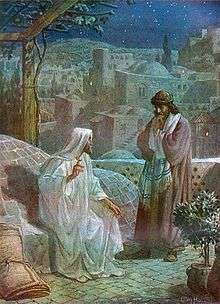 Jesus and Nicodemus (Ref. 7) Jesus and Nicodemus (Ref. 7)
Even though God unconditionally loves the world, there is one condition that God stipulates for mankind to accept his offer of salvation and eternal life - believing in (trusting in, having faith in) his Son Jesus. Jesus said to Nicodemus, "For God so loved the world, that He gave His only begotten Son, that whoever believes in Him shall not perish, but have eternal life" (John 3:16, John 3:1-2).
Is there a Penalty for Rejecting God's Offer?
Yes. The Bible tells us, "For God did not send the Son into the world to judge the world, but that the world might be saved through Him. He who believes in Him is not judged; he who does not believe has been judged already, because he has not believed in the name of the only begotten Son of God" (John 3:17-18). Jesus also stated, "Truly, truly, I say to you, he who hears My word, and believes Him who sent Me, has eternal life, and does not come into judgment, but has passed out of death into life" (John 5:24).
Why is God's Offer the Most Important Offer You Will Ever Receive?
Unlike what the world offers, God's offer of salvation and eternal life results in eternal life-giving benefits when you accept God's offer by believing in Jesus.
Apply. God offers you salvation and eternal life through his Son, Jesus Christ (John 3:16-17). Have you already accepted the most important offer that you will ever receive? If yes, then praise God. If not, will you accept God's offer by thanking Jesus for forgiving your sins and then fully trusting in him by faith today?
Related Lessons
"What Does 'To Be Saved" Mean in the Old Testament?" (Psalm 18:3) "What Does 'To Be Saved' Mean in the New Testament?" (Acts 16:31) "What is Eternal Life?" (John 17:3) "Biblical Definition of the World" (John 1:10)
References
1. Ref.1 begins on the next line https://americanart.si.edu/artwork/study-christ-and-nicodemus-rooftop-23686 2. http://www.ScriptureWay.com/home/biblical-definition-of-the-world 3. https://biblehub.com/greek/2434.htm 4. https://biblehub.com/greek/4982.htm 5. https://www.gotquestions.org/Christian-doctrine-salvation.html 6. http://www.ScriptureWay.com/home/what-is-eternal-life 7. https://en.wikipedia.org/wiki/Nicodemus
"He was in the world, and the world was made through Him, and the world did not know Him." (John 1:10)
This lesson is the first in the series on "Christians and the World." This lesson explains the meaning of the Hebrew and Greek words for "the world" in the Old and New Testaments of the Bible.
Consider. What does the expression, "the world," mean to you? Do you think of just the physical earth which God created? Or, do you think about the people of the world? Does the world described in the Bible include people who know Christ as well as those who do not know Christ?
"The World" - Old Testament Definition
In the Old Testament, the Hebrew word used most often for "the world" is tebel (pronounced as tay-bale'). "The world" (tebel) is the earth as moist and therefore inhabited (Strong's Exhaustive Concordance, Ref. 1). So, the word for "the world" in the Old Testament refers to the earth and by implication to the inhabitants of the earth (Ref. 1). The first mention of "the world" (tebel) in the Old Testament occurs in 1 Samuel 2:8. Tebel occurs 36 times in the Old Testament (Ref. 1).
The Old Testament describes "the world" in these four main ways:
"The World" - New Testament Definition
In the New Testament, the Greek word used most often for "the world" is kosmos. Kosmos means an "ordered system" (like the universe, creation) (Ref. 7). Kosmos also refers to the inhabitants of the world and to worldly affairs. Kosmos occurs 186 times in the New Testament (Ref. 7). "The world" (kosmos) occurs more often in the Gospel of John than in any other New Testament book (more than 70 occurrences in John).
The New Testament writers use "the world" (kosmos) in three main ways:
The Hebrew and Greek words for "the world" in both the Old and New Testaments of the Bible include not only the physical world which God created but also the people of the world. Even though God loves all the people of the world, some people know and love Christ, and others do not know Christ. Some people are hostile to Christ and to those who follow Christ. I plan to discuss God's love for the world in the next lesson in this series.
Apply. John, Jesus' disciple, wrote about Jesus, "He was in the world, and the world was made through Him, and the world did not know Him" (John 1:10). If you do not know Jesus Christ, put your faith and trust in him. Ask him to forgive your sins, and he will cleanse you from all unrighteousness (1 John 1:9). Ask Jesus to come into your life. You and he will begin a new relationship, and you will know him better each day. If you already do know Jesus, ask him to show you what steps you can take to help other people know him as their Savior and Lord.
Related Lessons
"The Holy Spirit Whom the World Cannot Receive" (John 14:16-17) "Do Not Love the World" (1 John 2:15) "The World Hates Jesus and His Disciples" (John 7:7, John 15:18-19) "God's Offer of Salvation and Eternal Life" (John 3:16-17)
References
1. https://biblehub.com/hebrew/8398.htm 2. https://biblehub.com/hebrew/4131.htm 3. https://biblehub.com/commentaries/barnes/psalms/24.htm 4. https://biblehub.com/commentaries/pulpit/psalms/24.htm 5. https://biblehub.com/hebrew/8199.htm 6. https://en.wikipedia.org/wiki/Joy_to_the_World 7. https://biblehub.com/greek/2889.htm
"Then Jesus again spoke to them, saying, 'I am the Light of the world; he who follows Me will not walk in the darkness, but will have the Light of life.' " (John 8:12)
"I have come as Light into the world, so that everyone who believes in Me will not remain in darkness." (John 12:46)
"Christ is the Light of the world. God is light, and Christ is the image of the invisible God. One sun enlightens the whole world; so does one Christ, and there needs no more." -- Matthew Henry (1662-1714) (Ref. 1, Ref. 2)
This lesson is the first in a series on the "I AM" statements of Christ. This lesson discusses Jesus' statement, "I am the Light of the world" (John 8:12).
Consider. What does it mean to you that Jesus is the Light of the world? Do you have the Light of life?
God is Light
The teaching that God is Light begins in the Old Testament and continues through the New Testament. David wrote, "The Lord is my light and my salvation; Whom shall I fear?" (Psalm 27:1). The prophet Micah said, "Though I dwell in darkness, the Lord is a light for me" (Micah 7:8). The disciple John, wrote, "God is Light, and in Him there is no darkness at all" (1 John 1:5).
God's Light Purposely Illumines Mankind
Jesus' Jewish listeners would recall Exodus 13:21 - "The Lord was going before them in a pillar of cloud by day to lead them on the way, and in a pillar of fire by night to give them light, that they might travel by day and by night." The psalmist wrote, "Thy word is a lamp unto my feet, and a light unto my path" (Psalm 119:105). The author of 2 Samuel 22:29 tells us "For You are my lamp, O Lord; And the Lord illumines my darkness."
"I am the Light of the world"
Jesus, the Eternal One, is the Light of the world because:
"He who follows Me will not walk in the darkness"
Let's discuss this phrase in three parts:
a) "He who follows Me" - The Greek word for follow is akoloutheó, which means to join as a disciple (Ref. 5). In John 8:12, Jesus "likens himself to a torch which the disciple follows" (Ref. 5). Jesus frequently spoke about what it means to follow him as a disciple (for example, Luke 14:27). b) "Will not walk" - The Greek word for walk is peripateó. Peripateó means (in the ethical sense) how I conduct my life (Ref. 6). c) "In the darkness" - The Greek word for darkness is scotia (Ref. 7). Scotia has a dual meaning. In the literal sense, scotia (darkness) is the absence of daylight (John 6:17). In the figurative sense, scotia (darkness) is the state we are in before we believe in Christ, that is, a state of ignorance, guilt, and sin (Ref. 8). Putting these three parts together - "He who follows Me shall not walk in darkness" means He who follows Me [Jesus] as a disciple will no longer conduct his life in a state of ignorance, guilt, and sin. Note that Jesus also said, "I have come as Light into the world, so that everyone who believes in Me will not remain in darkness" (John 12:46, italics added). Being in darkness is our (mankind's) default condition. Jesus has come so that when we believe in him, God the Father transfers us from the domain of darkness to the kingdom of the Son of God (Colossians 1:13). "But will have the Light of life"
Just as sight is a function of physical life, Christ is the Light for our spiritual life. John says, referring to Christ, "In Him was life, and the life was the Light of men" (John 1:4). When we believe in Jesus Christ, the divine light of Christ continually shines in us, guiding us to life everlasting (Ref. 9).
Apply. Do you believe that Jesus Christ is the Light of the world? If not, then pray and put your trust in him today.
Are you a disciple of Christ? Are you following him? Do you have the Light of life?
References
1. https://biblehub.com/commentaries/mhc/john/8.htm 2. https://en.wikipedia.org/wiki/Matthew_Henry 3. http://www.ScriptureWay.com/home/who-is-jesus 4. http://www.ScriptureWay.com/bible-verses-about-eternal-life 5. https://biblehub.com/greek/190.htm 6. https://biblehub.com/greek/4043.htm 7. https://biblehub.com/greek/4653.htm 8. https://biblehub.com/commentaries/poole/john/12.htm (Matthew Poole's Commentary on John 12:46) 9. https://biblehub.com/commentaries/benson/john/8.htm |
Daily Bible Verse
(Click the link above) Author
Mr. Whitney V. Myers. Christian. For more information, please visit the Author Page. Posting ScheduleI plan to provide new postings about once a month. Planned Topics(subject to change) Recent Posts(most recent three months) Popular Posts(top 10) Categories
All
Archives
March 2024
|
|
Copyright 2018-2024 Whitney V. Myers |
Listed in Feedspot's Top 100 Bible Study Blogs and Websites |
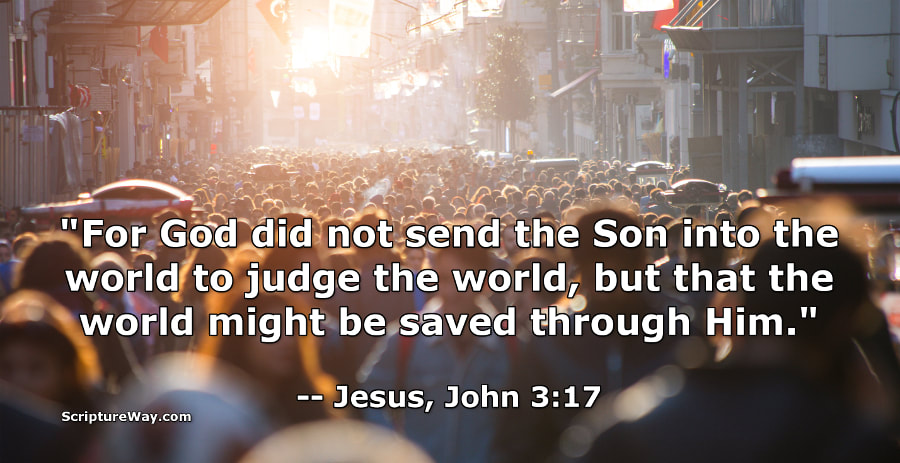


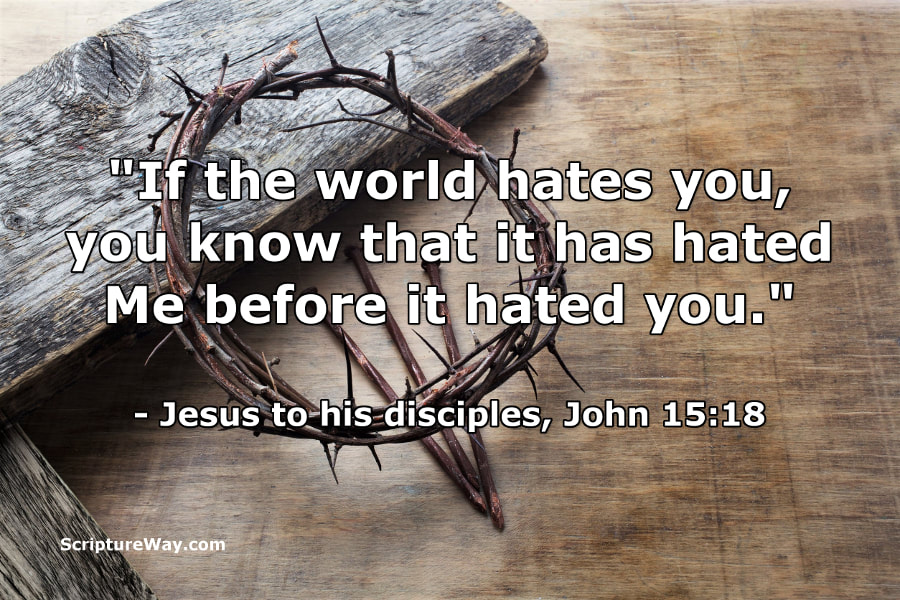
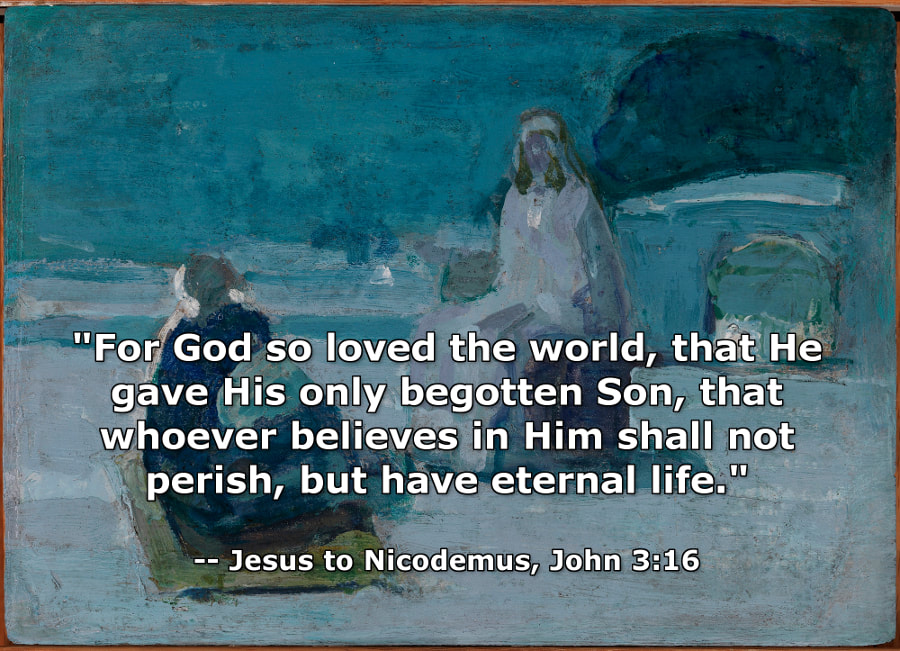
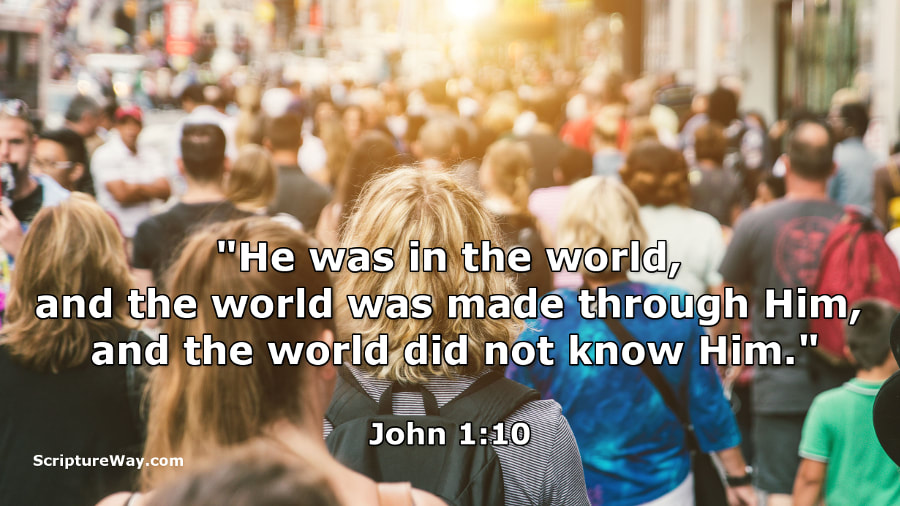
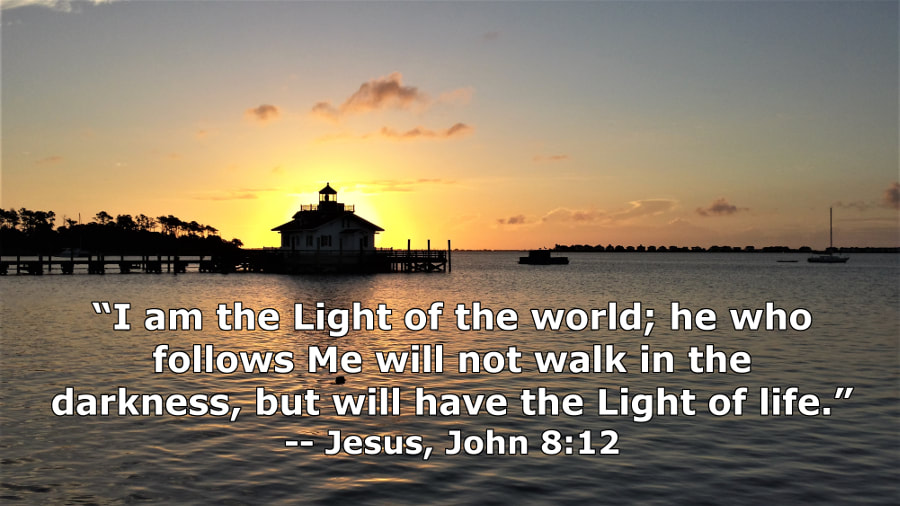
 RSS Feed
RSS Feed
